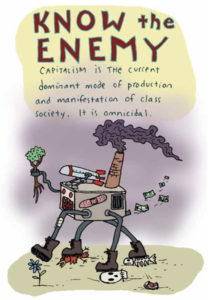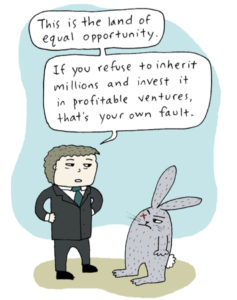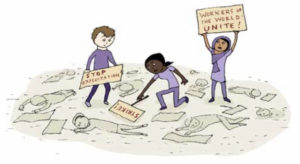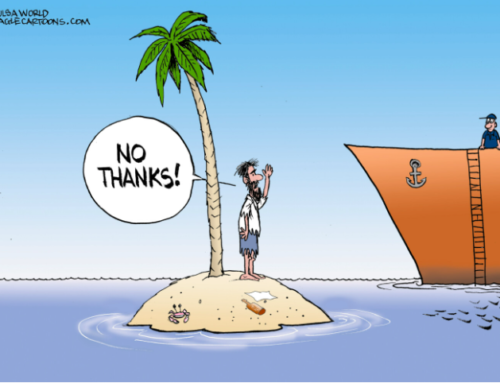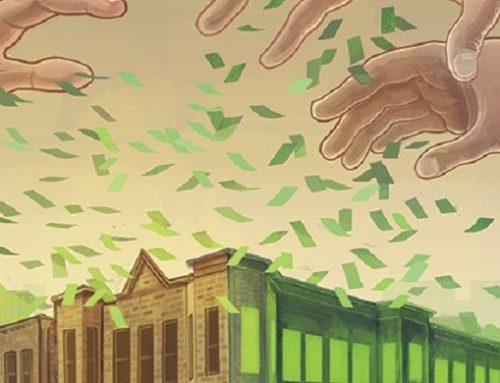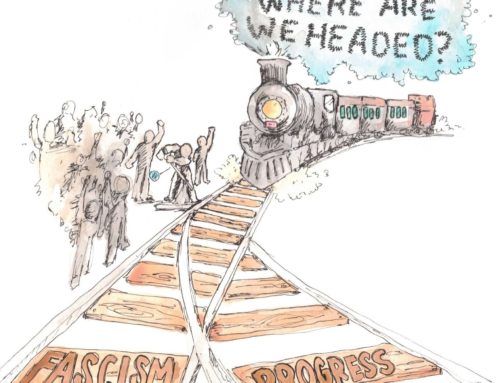Capitalism/imperialism is an economic system constructed for the purpose of theft and accumulation of wealth for those in power. Its built-in, insatiable drive for profit has caused measureless human misery all over the world, and is threatening the very existence of life on Earth.
Capitalism creates a class-divided society where wealth for some classes – the capitalist class (or bourgeoisie) and the so-called “middle class” (or petty bourgeoisie) – depends on the exploitation of the international working class.
The working class is responsible for the production of all commodities we see in the world. They take raw materials and turn them into physical goods and products — our tables, chairs, phones… This industrial production is the economic basis, the backbone of capitalism: agriculture, construction, textiles, manufacturing produced by the working class.
The profit capitalists make comes from the difference between the value they pay the workers (i.e. wages) and the value that workers actually create. For example, the newest iPhone costs roughly $1,000. The Chinese workers who assembled it were paid $1.50/hour, and the Congolese workers who mine cobalt to produce the phone were paid even less. The bulk of what we pay for the phone goes to Apple’s capitalists.
Because the system is built on exploitation, the relationship between the capitalist class and the working class is a relationship of antagonism. They have inherently contradictory interests, and each class fights for its own survival and reproduction. We call this process class struggle.
Capitalism maintains itself not just on the basis of brutal force, but also on the basis of ideology. It shapes what we think, the ways we spend our time, our moods, our choices. We consume culture that represents capitalists’ interests, not ours. Meritocracy, “human nature”, and individualism are bourgeois ideological elements used to keep us scrambling from survival in an arrangement that is inherently unequal and omnicidal. Elections are used to pacify us, neutralizing dissent and anger and channelling them back into the system.
Another important feature of capitalism is that it requires endless growth, expanding markets, and ever-increasing profits. This requires constant cuts to productions costs and inevitably leads to the commodification of everything, from basic necessities like food, water, housing and education to our personalities and habits. It also leads to the expansion of capitalism beyond national boundaries, which is why capitalism today has grown into imperialism, a global system where a handful of people in imperialist (“advanced”) countries own most of the global wealth.
Under capitalism, oil cannot stay in the ground. Water cannot remain a human right. Resources must be extracted without regard for the environmental or human cost. Wages must continually be cut. New markets for commodities must be sought. All of this must occur for capitalism to persist.
And why is capitalism in crisis?
Precisely because of this imperative to expand indefinitely, capitalists have created a new way to accumulate capital: through credit, financing and speculation. Since this form of accumulation does not produce physical goods, it is much cheaper and much faster for capitalists.
Because of this, basically every capitalist interest got involved in finance as a form of accumulation… even industrial capitalists. For example, car manufacturers and retail giants offer credit cards. Credit is how we all afford to live, to achieve the so-called “American Dream.”
Finance has made capitalists insanely wealthy, but it’s also made a mess in the global economy — and this where we get to the crisis part. Finance is a toxic form of capital, because it’s not grounded in tangible goods with real value… This is why we saw the 2008 crisis and housing bubble burst.
There is more speculative capital floating around than there are tangible goods/assets in the real world.
Some numbers to illustrate this. In 1975, 80% of all international transactions involved the real trading of a product. By 2011, that figure had decreased to 0.6%. The rest was fictitious, speculative finance.
So now, every fraction of the capitalist class is involved in finance capital in some way, and they can’t quit because so much of their wealth is intertwined in both finance and industrial capital. They’re impossible to separate.
At the same time, as we said, finance capital and speculation are killing the economy. It’s the heroin of the capitalist class.
And this crisis of finance capital is coupled with the fact that capitalism’s imperative to grow is reaching the physical limits of the planet. You can’t have infinite growth on a finite planet, and we see the effects of that through global climate change, sea level rise, deforestation, and generally unprecedented levels of environmental destruction.
Capitalism will not disappear or collapse by itself. If allowed to continue, it will devour all life on Earth. Capitalism also cannot be reformed, escaped, or replaced from within. It can only be eliminated through a collective revolutionary process.
One Struggle’s mission, at the intermediate level, is to build combative organizations and a mass popular democratic movement by engaging in struggles and uniting those of us in dominated classes. We engage in these struggles from a non-sectarian perspective. We maintain our independence and autonomy from NGO’s, political parties, and struggle to represent the people’s interests. We share information, build solidarity and coordinate activities among those involved in social justice, anti-imperialist and environmental struggles, so that we can strengthen our fight against our common enemy: the global capitalist system.
It is all ONE STRUGGLE.

